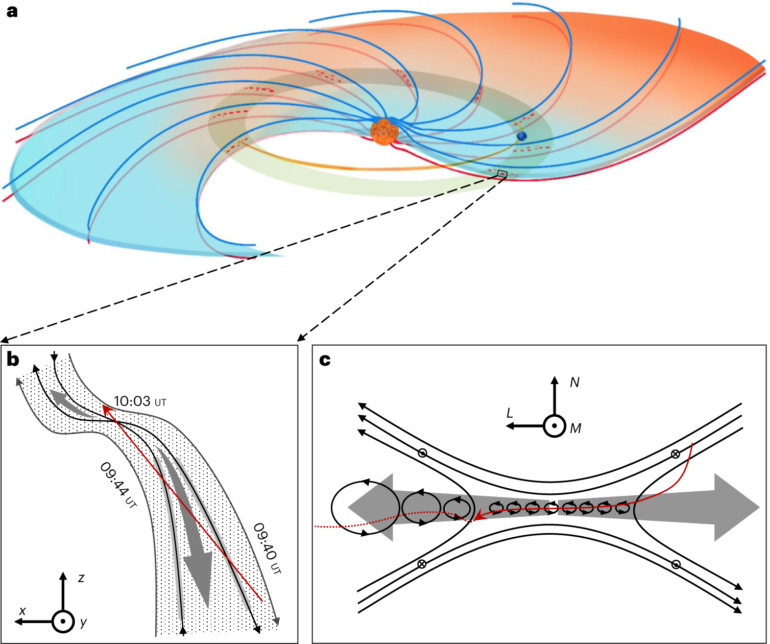Researchers from the University of Science and Technology of China (USTC) of the Chinese Academy of Sciences, under the direction of Prof. Wang Rongsheng and Prof. Lu Quanming, used data from the Magnetospheric Multiscale (MMS) mission to directly observe bursty and turbulent magnetic reconnection in the solar wind. Their findings were published in Nature Astronomy.
Magnetic reconnection is an energy-releasing process that causes explosive phenomena in interplanetary space. During the process, the magnetic energy is rapidly released to heat and accelerate the plasmas. Previous satellite observations of reconnection often display a bursty and turbulent state, such as flares on the surface of the sun, geomagnetic storms, and substorms in the planetary magnetospheres.
Sweeping from the sun and spreading over interplanetary space, the solar wind builds a bridge between solar bursts and magnetospheric turbulence. Unlike bursty and transient types in planetary magnetospheres, the previous viewpoint assumed magnetic reconnection in the solar wind displays a quasi-steady state, but there have been few direct detections of magnetic reconnection in the solar wind.
The research team utilized the high-resolution data of the MMS to detect the turbulent reconnection in the solar wind. The MMS is a four-spacecraft tetrahedron structure launched in 2015, aiming to unveil the secrets of the electron diffusion region of magnetic reconnection. Since October 2017, the MMS apogee has been raised to 25 Earth radii, making it possible to collect data in the interplanetary solar wind.
For the first time, the research team found direct evidence of the turbulent reconnection in the solar wind. Moreover, the filamentary currents and flux ropes inside the diffusion region are observed, leading to a turbulent diffusion region. During the turbulent reconnection, the ions and electrons are effectively heated.
Based on the 76 magnetic reconnection events observed by the MMS, the researchers proved that bursty reconnection in the solar wind is more common than previously thought, and is responsible for solar wind acceleration and heating. They also found that the occurrence rate of reconnection increases with the speed of the solar wind.
This study reveals that turbulent magnetic reconnection can play an essential role in the energization of plasmas in the solar wind.
More information:
Rongsheng Wang et al, Direct observation of turbulent magnetic reconnection in the solar wind, Nature Astronomy (2022). DOI: 10.1038/s41550-022-01818-5
Provided by
University of Science and Technology of China
Citation:
Researchers observe directly turbulent magnetic reconnection in solar wind (2022, December 2)



